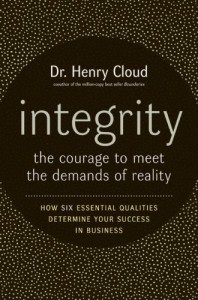Our theme verse for the 2011-2012 school year at North Cobb Christian School is 1 Chronicles 29:17, “I know, my God, that you test the heart and are pleased with integrity.” Over the course of the year, my role as a leader will be to continually direct our faculty and students to this verse as we consider it in light of the lifestyle that God has called us to as followers of His. As a result, I am doing a lot of reading this summer about integrity and the implications of integrity in the life of a believer. One of the top books on my list to read was Dr. Henry Cloud’s Integrity: The Courage to Meet the Demands of Reality.
I will have to say that I really learned a ton from this book. In particular, I enjoyed the way that Dr. Cloud talked about the way that our experiences shape us and engrave a groove that we tend to lead out of. I also appreciated his encouragement to “lean in” to difficult situations rather than try to fix them without listening and fully understanding what is at stake. Dr. Cloud focused on six essential qualities that can lead to ultimate success for a leader…
- The ability to connect authentically (which leads to trust).
- The ability to be oriented toward the truth (which leads to finding and operating in reality)
- The ability to work in a way that gets results and finishes well (which leads to reaching goals, profits, or the mission)
- The ability to embrace, engage, and deal with the negative (which leads to ending problems, resolving them, or transforming them)
- The ability to be oriented toward growth (which leads to increase)
- The ability to be transcendent (which leads to enlargement of the bigger picture and oneself )
I plan to reread this book again in a few months to assess where I am on some of the points that Dr. Cloud suggested. Here are some other things that I highlighted while reading on my Kindle.
- Integrity is the courage to meet the demands of reality.
- “People who become leaders, or really successful, tend to have three qualities. Number one, they have some set of competencies.
- Alliance building is key to success and leadership. It is more than ‘networking,’ which is often just a synonym for leeching. Alliances are about creating leverage to take what you do to a multiple.
- They have to have the character to not screw it up.
- Who a person is will ultimately determine if their brains, talents, competencies, energy, effort, deal-making abilities, and opportunities will succeed.
- When a person travels through a few years with an organization, or with a partnership, or any other kind of working association, he leaves a “wake” behind in these two areas, task and relationship: What did he accomplish and how did he deal with people? And we can tell a lot about that person from the nature of the wake.
- Do you think that anyone ever asked him in his job interview how he goes about building trust with people and making sure that other parts of the company trust him as well?
- Character is everything, depending on what demands are going to be put upon the design.
- Character = the ability to meet the demands of reality.
- When we are talking about integrity, we are talking about being a whole person, an integrated person, with all of our different parts working well and delivering the functions that they were designed to deliver. It is about wholeness and effectiveness as people. It truly is “running on all cylinders.”
- Bottom line: the character issues will affect the one or two things you do well, forgetting any need to do the rest.
- Another way of saying this is that while you don’t need all the gifts that exist in the world, you do need all the aspects of character while you are putting your gifts to work.
- We are somewhere on a continuum from little ability to connect and the ideal. So, underdevelopment leaves a gap between where we are at any given moment and where we need to be. That gap is our need and opportunity for growth.
- Dysfunctional as I use it means that not only is someone imperfect in some ability, but the actual exertion of effort in that area causes more problems, or a greater gap, than it solves. In other words, it would have been better if people had not tried, because the end result is worse than where they started.
- Someone of virtue is a force, and a force always leaves a result.
- If he were leaning into her reality and experience, and joining it, they would have been together, and the room would have been right there with them too.
- The one who understands is the one who wins a customer who will not only choose to come back, but actually wants to.
- If we cannot communicate our listening in a way that lets the other person know we have truly understood, empathy has not occurred.
- True listening and understanding occurs only when the other person understands that you understand.
- Unity forms around mutual care based in empathy.
- They talk → you experience them → you share what you have heard and experienced about their experience → then they experience you as having heard them. They then know you are “with them.”
- The human heart will seek to be known, understood, and connected with above all else. If you do not connect, the ones you care about will find someone who will.
- True trust comes when we realize that another’s goodness, and being for my best interest, is not dependent on anything.
- Leaders without grace set the demand and do nothing to help people meet it.
- Not enough power, and we can’t entrust things of value to the person. Too much power, and we can’t feel that they could ever understand or relate to our own vulnerability.
- Encourage literally came from “in courage.” The courage is put “into” you from the outside.
- The boss, leader, parent, or friend who can be vulnerable enough to show that he or she has felt similar things and has made it through or overcome in some way is the one who gains our trust.
- The tension between vulnerability and strength in leaders cannot be lost.
- The consequences of deceit are usually greater than the ones of the truth.
- Reality is always your friend.
- The character who seeks reality about himself or herself has the courage to embrace whatever reality he finds.
- Character that sees itself is usually able to self-correct.
- The ability to control your thinking when your emotions are enflamed is huge for success.
- All things being equal, character wins.
- People do well when they do what they do well and stay away from what they do poorly.
- In the same way that we metabolize food, we metabolize experience. Experience becomes our character, as we have seen earlier, just as food becomes the cellular makeup of our bodies.
- No problems, no profit.
- Profit comes as a result of facing problems, so doing it is seen as a good thing, not a negative thing.
- The leaders who are respected are the ones who can be depended on to deal with things directly and competently.
- Integrated characters are able to recover motivation, hope, judgment, clear thinking, drive, proactivity, and the other faculties needed to move something forward after something bad happens.
- “Decatastrophize” the outcome.
- Outcomes are separate from the person, and the people who perform have a stable sense of self no matter what happens.
- Blame is the parking brake for improvement.
- If you fail to confront, you will lose. But, if you confront poorly, you will also lose. So, you must confront, but confront well. That means that the truth-telling side of your character must be integrated with the loving and caring side of your character. When you show up to deal with a problem, you must bring both of them together. Confront the problem, but in a way that preserves the relationship and the person.
- “I try to go hard on the issue and soft on the person.”
- Honesty without love is not integrity.
- You and I versus the problem.
- Integration says that our character will not allow one part of us to do something that another part of us is not cool with.
- It is pretty tough to solve problems without also connecting to others and being oriented toward the truth.
- People do not get put to use by others. They have to invest themselves.
- The invisible world of character is where the visible world always originates.
- The character who truly produces increase is one who is creating from an outgrowth of real passion and investment in things that he or she cares about from the heart.
- If you look at the growers’ checkbooks and calendars, you see them spending time and money on set structures in their lives.
- Another aspect of growth characters is the ability to seek out and submit to “mentors,” or people who are further down the road. They can take input, and modeling, and are not ashamed to ask for it.
- You will not grow without attempting things you are unable to do.
- Fields need to lie fallow to restore fertility for future harvests.
- Your work cannot fulfill all of your needs as a person. Nor can your relationships.
- To live and flourish, we must bow to the things larger than us.
- There is only one true “regulator,” and that is a person’s character integrity when it is oriented towards transcendence.
- Character always wins.
- You can love someone or a value or a mission or a purpose, but until you have denied yourself something that you value for the sake of the other, then love is not enough. Self-denial is always about loss. It is the willingness to lose something that truly matters to us for the service of something bigger.
- The immature character asks life to meet his demands. But the mature character meets the demands of life.
- One Greek word that is sometimes translated as “character” is one that means “experience.” Another means “engraved mark.” The experiences that you have been through have largely shaped who you are and “engraved” certain patterns and ways of behaving and responding in you.
- The “boss” relationship should be just this way: observe, give feedback, coach, monitor, and grow.


